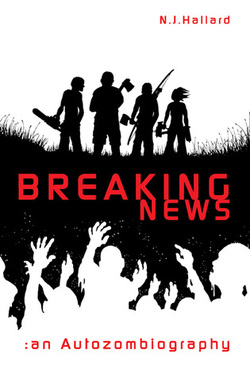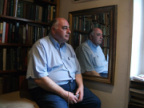
A friend recently recommended “Breaking News: An Autozombiography” [1] for me to read. They thought that I might find it interesting, informative, and that I would enjoy the storyline. The recommendation was based upon the knowledge that we are currently deep into a project on wild card scenarios, and that we are now writing into fiction some of the storylines that have been generated by that project. I have already written about a structural framework through which wild card scenarios – or storylines – can be generated [2], and this aspect of our work takes it to the next step.
I am not quite ready to accept that a zombie novel could be considered a wild card scenario because it only has two of the three key attributes that we would like to see from a wild card scenario. The zombie novel certainly has a very low probability 0f occurring, and it will definitely have a high impact if it were to occur, but the central premise of the zombie story – the living dead – lacks a key element of scientific plausibility. It is this lack of plausibility that places the fiction of the zombie story outside of the canon of wild card scenarios. There is a contrary view that, in a world with the possibility of global pandemics, such as with Ebola disease [3], we ought not to be too dogmatic in our view because, in the new diseases of the future, there is no way of knowing how they will play out.
If we were to experience a zombie emergency, how would we react to it? The Kubler-Ross model ( the five stages of grief) from psychology provides a good framework for analysing this [4]. The model suggests a transition from denial to anger, to bargaining, to depression, through to acceptance. In many respects, the progress of the book is along this journey. The novel splits into four sections. The first is concerned with the recognition that there is a viral outbreak of the zombie virus. I found that to be quite an interesting part of the book. It is all about a denial by the general population of the evidence all around them. It takes a while for people to work out what is going on, and by then, for many of them, it is too late.
Once the survivors had recognised what is going on, then anger soon sets in. The second part of the book is all about retribution (killing as many zombies as possible) and finding somewhere to stay. There is an element of bargaining in this, where the group goes out to forage for food, water, and other essential supplies. This contrast between the destruction of the zombie hordes and the creation of a new society provides a dramatic tension within the novel that works very well. It provides the focus for the depression within the story – that the task of building afresh whilst fighting off the zombie menace might overwhelm the small community. This creative aspect occupies the third part of the book, which I found immensely interesting.
Of course, like all quest stories, the heroes of the story manage to attain their quest. The fourth part of the book is the one devoted to the future of the small community. I have to say that is an issue which I consider well worth studying. However, I found this to be the weakest part of the book. It would seem that the British monarchy have survived the crisis and are seeking to command the loyalty of the remaining small communities of survivors. Why these communities should have any particular loyalties towards an institution that abandoned them to their fate escapes me. There were so many inconsistencies in the ending that I found it to be pretty unconvincing. However, the story is to be continued in a sequel to the book, which I await with great anticipation.
The book is well written and the pace of the narrative keeps the reader moving along quite nicely. There are some good touches to the narrative, such as the golfer zombie who continues his swing on the golf course, just out of the sheer habit of doing so. I guess we all know someone like that. There are also some good jokes and quirks in the narrative that manage to keep the plot interesting, such as Bub the captured zombie. In terms of being just a good read, the book has much to recommend it. However, it also has something extra. The book serves as a good template for writing wild card scenarios, whether it be the aftermath of a flu pandemic or the consequences of a solar burp that wipes out all of the electronics on Earth. It is for this reason that I am grateful to my friend for recommending this book.
What do zombie novels have to do with future studies? Until recently, I would have answered that they don’t really have an awful lot to do with each other. I think that it now might be time to change my mind.
Stephen Aguilar-Millan
© The European Futures Observatory 2014
References:
[1] ‘Breaking News: An Autozombiography’ by N J Hallard (Cissbury Publishing 2010, ISBN 978-1-4457-8538-7)
[2] My piece can be accessed at: http://www.eufo.org/uploads/1/4/4/4/14444650/wfr_june_2013_aguilar-millan.pdf
[3] See the Wall Street Journal for one case of Ebola disease being moved from the point of incubus in Africa to North America for treatment: http://online.wsj.com/articles/cdc-chief-seeks-to-allay-ebola-fears-1407081530
[4] See the Wikipedia entry for the Kubler-Ross model: http://en.wikipedia.org/wiki/K%C3%BCbler-Ross_model
I am not quite ready to accept that a zombie novel could be considered a wild card scenario because it only has two of the three key attributes that we would like to see from a wild card scenario. The zombie novel certainly has a very low probability 0f occurring, and it will definitely have a high impact if it were to occur, but the central premise of the zombie story – the living dead – lacks a key element of scientific plausibility. It is this lack of plausibility that places the fiction of the zombie story outside of the canon of wild card scenarios. There is a contrary view that, in a world with the possibility of global pandemics, such as with Ebola disease [3], we ought not to be too dogmatic in our view because, in the new diseases of the future, there is no way of knowing how they will play out.
If we were to experience a zombie emergency, how would we react to it? The Kubler-Ross model ( the five stages of grief) from psychology provides a good framework for analysing this [4]. The model suggests a transition from denial to anger, to bargaining, to depression, through to acceptance. In many respects, the progress of the book is along this journey. The novel splits into four sections. The first is concerned with the recognition that there is a viral outbreak of the zombie virus. I found that to be quite an interesting part of the book. It is all about a denial by the general population of the evidence all around them. It takes a while for people to work out what is going on, and by then, for many of them, it is too late.
Once the survivors had recognised what is going on, then anger soon sets in. The second part of the book is all about retribution (killing as many zombies as possible) and finding somewhere to stay. There is an element of bargaining in this, where the group goes out to forage for food, water, and other essential supplies. This contrast between the destruction of the zombie hordes and the creation of a new society provides a dramatic tension within the novel that works very well. It provides the focus for the depression within the story – that the task of building afresh whilst fighting off the zombie menace might overwhelm the small community. This creative aspect occupies the third part of the book, which I found immensely interesting.
Of course, like all quest stories, the heroes of the story manage to attain their quest. The fourth part of the book is the one devoted to the future of the small community. I have to say that is an issue which I consider well worth studying. However, I found this to be the weakest part of the book. It would seem that the British monarchy have survived the crisis and are seeking to command the loyalty of the remaining small communities of survivors. Why these communities should have any particular loyalties towards an institution that abandoned them to their fate escapes me. There were so many inconsistencies in the ending that I found it to be pretty unconvincing. However, the story is to be continued in a sequel to the book, which I await with great anticipation.
The book is well written and the pace of the narrative keeps the reader moving along quite nicely. There are some good touches to the narrative, such as the golfer zombie who continues his swing on the golf course, just out of the sheer habit of doing so. I guess we all know someone like that. There are also some good jokes and quirks in the narrative that manage to keep the plot interesting, such as Bub the captured zombie. In terms of being just a good read, the book has much to recommend it. However, it also has something extra. The book serves as a good template for writing wild card scenarios, whether it be the aftermath of a flu pandemic or the consequences of a solar burp that wipes out all of the electronics on Earth. It is for this reason that I am grateful to my friend for recommending this book.
What do zombie novels have to do with future studies? Until recently, I would have answered that they don’t really have an awful lot to do with each other. I think that it now might be time to change my mind.
Stephen Aguilar-Millan
© The European Futures Observatory 2014
References:
[1] ‘Breaking News: An Autozombiography’ by N J Hallard (Cissbury Publishing 2010, ISBN 978-1-4457-8538-7)
[2] My piece can be accessed at: http://www.eufo.org/uploads/1/4/4/4/14444650/wfr_june_2013_aguilar-millan.pdf
[3] See the Wall Street Journal for one case of Ebola disease being moved from the point of incubus in Africa to North America for treatment: http://online.wsj.com/articles/cdc-chief-seeks-to-allay-ebola-fears-1407081530
[4] See the Wikipedia entry for the Kubler-Ross model: http://en.wikipedia.org/wiki/K%C3%BCbler-Ross_model
 RSS Feed
RSS Feed



